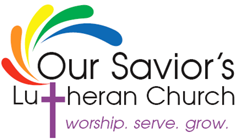Sunday, October 6, 2019 – Pentecost 17
October 6, 2019
Pentecost 17 2019
Our Savior’s La Crosse
Luke 17:5-10
If I asked you which parable from the gospels is your favorite (if you have a favorite), I’m fairly confident most people would not name the Parable of the Worthless Servant (which is the name of the parable we have as our gospel text).
For a few reasons, this parable is a rotten little story…
First, we cannot avoid the slave imagery that is used. Some translations of the story substitute the word “servant” for slave. They may be trying to avoid the reality of the reading; there were slaves in the first century just as there were in 18th and 19th century nations just as there are now. Our American history is stained by an economy that was dependent on slave labor. Our history as a nation bleeds into current economic and social structures that continue to create haves and have nots, some of which is dependent on race and culture. These are subjects that make people uncomfortable. We never want our collective sins to be “aired” so publically.
Second, who wants to think of God as a slave driver? As a master? The imagery is grotesque. Particularly because that makes all of us who follow God slaves. Likening discipleship to slavery is sickening.
Third, if we accept the imagery of slave and master, the conclusion of the argument is: the disciples (that’s us) get no reward for their labor. Even if the “slave” (and again, that is us) does everything the slave has been asked to do—the slave is still “worthless” (Luke 17:10).
How do you visualize your relationship with God?
Do you imagine yourself as a much loved child held in the arms of a loving parent? Do you imagine yourself working all day and all night in servitude to God, giving all of yourself and all of your time and all of your talent, with no reward?
Here’s a visualization of the text as provided by one scholar:
The parable assumes the hearer’s familiarity with the customs that controlled the lives of slaves in the first century. Like many of Jesus’ parables in Luke this one begins with the question “Who among you…? And expects a negative answer, “No one; it would be unthinkable.” The parable assumes a small farmer who has one slave who does both the field work and the household chores. The master would never say to the slave, “Come here at once and take your place at the table.” Instead, the [slave] would be expected to start preparing the master’s evening meal immediately after coming in from the fields. Only after he had served the master could the [slave] tend to his own needs. The master would not even thank the servant for doing what was commanded. (“Luke 17:1-10 Commentary” in The New Interpreter’s Bible volume 9, p. 323).
This parable is making a significant point about God and about us as God’s disciples—an unpleasant point—God does not and will not reward our faithful discipleship. That makes for a great sermon, I say sarcastically.
But this is a sound, theological message. As the same scholar previously cited wrote: God owes us nothing for living good, Christian lives. God’s favor and blessing are matters of grace—they cannot be earned” (ibid Luke 17…).
There is good news in this.The good news is: we don’t ever have to earn God’s grace. God’s grace is a gift. God loves us. God forgives us. God frees us from any need to earn those things. God’s love is a gift.
A second piece of good news is this: if we do what we do for God, as disciples, because we think we HAVE TO in order to receive God’s love and grace, we can LET GO of thinking we HAVE TO. We don’t. There is no obligation. There is no reward.
So why be disciples? Why work on behalf of God? Why do things here at church or out in the neighborhood or in the world in the name of God?
The answer is two-fold.
First, because we want to. As God’s faithful children we want to love others. This is our way of saying thank you to God for all God gives us. Someone gives you twenty dollars you say “thank you.” God has given us God’s love. God has given us forgiveness of our sins. God promises to give us eternal life. Of course we say “thank you” in any way we can.
Second, because God asks us to. God asks us to love our neighbors as ourselves. God asks us to feed the hungry and clothe the naked. God asks us to care for refugees and share our wealth. God asks us to sing songs of praise. God asks us to pray.
Our acts of discipleship are for God—not for us.
Our acts of discipleship are expressions of thanksgiving, freely given to God, for God, from grateful hearts. This is a blessing: that we are free to choose how we might respond to all God gives us, all God provides for us, all God offers us.
Thanks be to God always for this freedom and this love.

